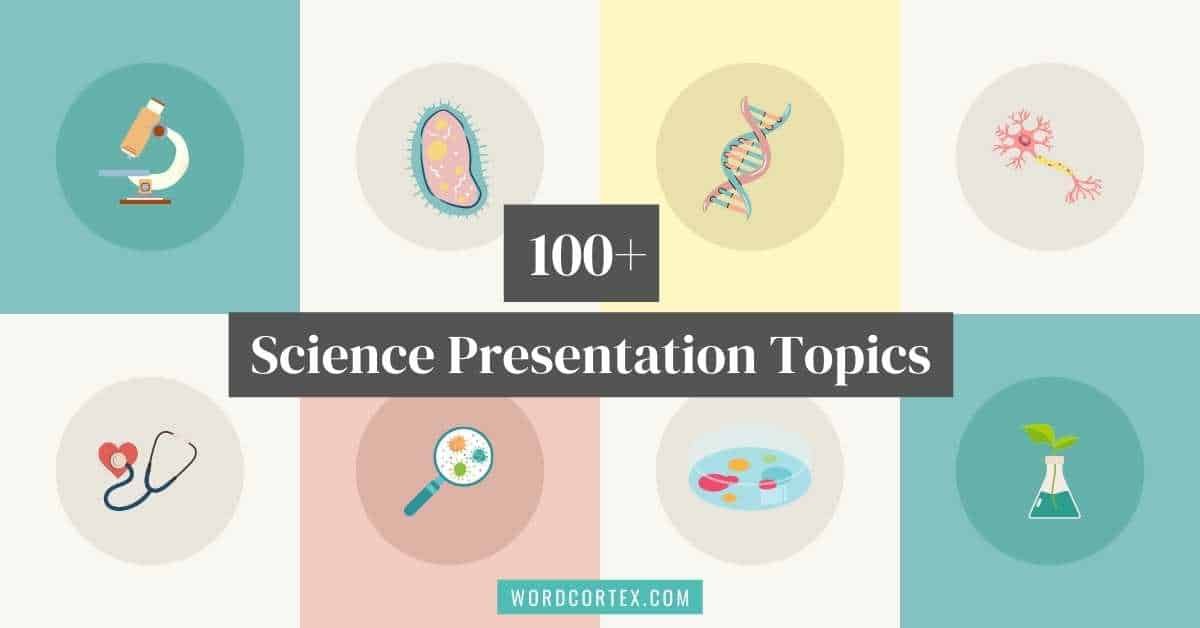100+ Fascinating Science Presentation Topics For Any Audience
Looking for science presentation topics and ideas for your next presentation? Well, you’re in the right place! Below are hundreds of science presentation ideas personally curated by a science writer. (Hey, that’s me!)
Whether you’re gearing up for a class project, a science fair, or a public speaking class, choosing the right presentation topic can make all the difference.
The good news? I’ve categorized these topics into different fields of science, so you don’t have to spend hours brainstorming.
In this post, you’ll find a comprehensive list of engaging and thought-provoking science presentation topics to help spark your creativity and make your talk stand out.

100+ Interesting Science Presentation Topics To Spark Curiosity in Any Audience
Here are hundreds of topics spanning several subject areas in science. I’ve made sure that the list includes some of the most interesting topics under each category.
I’ve written these as ready-to-use presentation titles (much like I would when writing a headline for a science article). So, you can use them as-is to start preparing your talk.
Alright, let’s dive in and find a topic that’s just right for you!
🧬Genetics and Molecular Biology Presentation Topics
- DNA Detectives: How Scientists Modify Genes to Study Diseases
- Can Your Environment Change Your Genes? Exploring Epigenetics
- The Human Genome Project: What Really Makes Us Human?
- Where Do We Come From? Exploring Ancestry Through DNA Kits
- The Genetic Code: How Life’s Blueprint Is Written
- CRISPR: The DNA Editing Tool That Could Cure Diseases
- Designer Pets: Should We Genetically Engineer Cats and Dogs?
- The Science of Cloning: Can We Bring Back Extinct Animals?
- The First Immortal Cell Line: Story of Henrietta Lacks
- Get Your Gloves On: How Scientists Isolate and Study Our DNA
- DNA Fingerprints: Using Genetics to Solve Crimes
🧠 Neuroscience Presentation Topics
- How Memory Works: Why We Remember Song Lyrics But Forget Passwords
- The Neuroscience of Music: How Songs Affect Your Brain
- Are Video Games Bad For The Brain? (Not Really!)
- Why Do We Feel Fear? Inside the Amygdala
- The Science of Addiction: Why Is It So Hard to Quit?
- What Happens in The Brain When We Taste Spicy Food?
- Mirror Neurons: How We Feel What Others Feel
- Sleep and Memory: Why The Brain Needs a Nap to Learn New Things
- The Brain’s CEO: How The Prefrontal Cortex Makes Executive Decisions
- Dopamine Kick: How Social Media Apps Grab Our Attention and Keep Us Browsing
- The Surprising Benefits of Exercise in Keeping The Brain Healthy
- Neurotransmitters: How The Brain Sends and Receives Messages
- ‘Is It a Bird or a Plane?’: How Visual Information is Processed
- The Effect of Alcohol on Brain Function
- Neuroplasticity: Is It Ever Too Late to Learn a New Language?
- Methods in Neuroscience: How Scientists Look Into The Brain
🦠 Microbiology Presentation Topics
- Pandemics and Epidemics: How Do Diseases Spread?
- Could Microbes Be the Oldest Life in the Universe?
- Antibiotic Resistance: How Do Superbugs Evolve?
- Bacteria vs. Viruses: What’s the Difference and Why It Matters
- Can Microbes Clean Up Pollution? The Role of Bacteria in Bioremediation
- The Simple Practice of Hand Washing: Why It’s So Important?
- Cold and Flu Season Survival Guide: What To Do (And What Not To Do)
- Gut Bacteria: What Are They and How They Affect Your Health
🐾 Animal Science Presentation Topics
- Animal Intelligence: How Smart Are Dolphins, Crows, and Octopuses?
- Cloning Animals: Should We Bring Back the Woolly Mammoth?
- No Recalculating: How Do Animals Migrate Without GPS?
- Animal Superpowers: Regenerating Limbs & Hiding in Plain Sight
- Myth or Fact: Can Dogs Really Detect Diseases Like Cancer?
- The Ethics of Zoos and Wildlife Parks: Are They Helping or Hurting?
- Can We Talk to Animals? The Science of Animal Language
🌱 Plant Science Presentation Topics
- The Science Behind Plant-Based Meat
- Can Plants Feel Pain or Emotions?
- Secret Conversations: How Plants Communicate Underground
- Vertical Farming: Can We Grow Food Without Soil?
- Photosynthesis: The Solar Power of the Natural World
- Plants as Medicine: Ancient Remedies and Modern Cures
- Tough Life: How Plants Survive in Extreme Environments Like Deserts and the Arctic?
🤖 Artificial Intelligence (AI) Presentation Topics
- How AI Is Changing Our Lives: From Siri to Self-Driving Cars
- ‘Paging Doctor AI’: Would You Trust a Robot to Perform Your Surgery?
- The Ethics of AI: Should We Be Worried?
- Can Robots Replace Humans? The Future of Jobs
- AI Gone Wrong: Why AI Simply Can’t Get Some Things Right (For Now)
- The Rise of Chatbot Customer Support: Can They Solve Problems?
- ‘Alexa, Do My Homework’: Should AI Be Allowed in Education?
- AI in Everyday Life: How Smart Tech Helps (or Hurts) Us
🧠 Psychology Presentation Topics
- Why We Procrastinate (And How to Stop)
- The Mandela Effect: How Reliable Is Your Brain’s Memory?
- Friend or Foe? The Effects of Social Media on Mental Health
- The Placebo Effect: Can Believing in a Cure Actually Heal You?
- The Longstanding Effects of Stress on Your Body and Brain
- Emotional Intelligence: Why It Matters More Than IQ
- The Science of Happiness: Can We Train Our Brains to Be Happier?
- Are You Getting Enough Sleep? How Sleep Affects Brain Function
- Do Dreams Carry Any Meaning?
- The Bystander Effect: Why Do People Ignore Someone in Need?
- The Power of Habits: How to Build Good Ones and Break Bad Ones
🌌 Space and Planetary Science Presentation Topics
- What If Earth Lost Gravity for Just 5 Seconds?
- The Science Behind Space Travel: How Do Rockets Work?
- Can We Ever Live on Mars?
- Why Pluto is No Longer a Planet
- Saturn’s Rings: What Are They Made Of?
- Asteroids, Comets, and Meteors: What’s the Difference?
- The Big Bang: How Did the Universe Begin?
- Moon Landing: What It Took For Humans to Walk on The Moon
- Can We Deflect an Asteroid Headed to Collide with Earth?
- Through the Eyes of The Largest Telescope in Space: The James Webb Space Telescope
- Black Holes: What Happens If You Fall Into One?
🌎 Environmental Science Presentation Topics
- The Science of Recycling: How It Really Works (and Doesn’t)
- Electronic Waste: What Happens to All the Old iPhones?
- Adapt or Die: How Humans Are Coping with a Changing Climate
- Predicting the Future: How Scientists Model Climate Change
- Is Climate Change The Reason Behind So Many Wildfires?
- How Microplastics Are Invading Our Oceans (And Our Lives)
- Trash Talk: The Growing Problem of Plastic Pollution
- What Happens When We Run Out of Fossil Fuels?
- What is Space Junk (And Why Is It a Problem)?
🍎 Food Science Presentation Topics
- Nutrients 101: How Your Body Uses Food as Fuel
- Lab-Grown Meat: Will It Replace Traditional Meat?
- Why Does Food Taste So Good: The Science of Flavors
- The Truth About Sugar: How It Affects Your Brain and Body
- How Do Food Preservatives Work? (And Are They Safe?)
- Food Coloring: The Good, The Bad and The Ugly
- Is Your Snack Really Healthy? Understanding Food Labels
- Plant-Based Protein vs. Animal Protein: What’s the Difference?
- The Science of Food Allergies: Why Do They Happen?
- How Chocolate Is Made (And Why It Melts in Your Mouth)
- The Art (And Science) of Making Cheese
- Restricting Food Intake: Do Diets Work?
- How Is Food Safety Maintained From Farm to Table?
- Plastic-Free Lunch: The Future of Eco-Friendly Food Packaging
🩺 Health and Medicine Presentation Topics
- The Science of Vaccines: How Do They Protect Us?
- Personalized Medicine: Can Doctors Tailor Treatments to Your DNA?
- Stopping Pain: How Do Painkillers And Anesthetics Work?
- The Future of Surgery: Can We Operate Without Cutting?
- Medical AI: Can Robots Replace Doctors?
- The Drug Discovery Pipeline: How Scientists Develop Therapeutic Drugs
- The Benefits of Walking 10,000 Steps Daily
- Can We 3D-Print Organs? The Future of Transplants
- Why Some Diseases Don’t Have a Cure Yet
Found a Topic You Like? Here’s What To Do Next…
Now that you’ve picked a science presentation topic that excites you, let’s get ready to put our presentation together.
- Gather accurate facts: Seek credible sources for additional information on your topic. The National Institutes of Health (NIH) website contains fact-checked and up-to-date information on hundreds of scientific topics. For example, here is a page on the National Human Genome Research Institute (NHGRI) website with tons of ready-to-use resources on the human genome.
Scientific association websites, such as the Society for Neuroscience or the American Association for Cancer Research, also contain trustworthy information on their respective topics.
Reputable science news outlets, such as ScienceNews or EurekaAlert are great sources for recent articles on your topic.
- Develop your thesis statement: Get clear on your main message. Ask: What’s the one thing I want my audience to know, do, or feel at the end of my presentation?
Remember, while it’s helpful to share your opinions and experiences in your presentation, you need to support your main points with real facts or robust data.
- Conduct an audience analysis: Think about who you’re speaking to. What’s their level of knowledge? What will grab their interest? What are they expecting from you (the presenter)? Once you know your audience better, modify your presentation content to suit their profile.
- Pick a presentation style: Will your presentation be informative or persuasive? Information presentations include how-to, step-by-step guides, ‘did you know’ trivia, the history of a topic, and so on. Meanwhile, persuasive presentations share a new perspective, a strong point of view, unknown truths, and so on.
Either style works for science presentations. So, choose what works best for your topic and audience.
- Add relevant visual aids: Images, videos, animations, infographics, or 3D models — there are so many ways to include visual aids in your science presentation. Choose the type of visual aid that can make complex ideas easier to understand.
With these steps, you, my friend, are well on your way to delivering an engaging and memorable science presentation. Now, go show ’em how it’s done!
Get actionable communication tips straight to your inbox
No fluff. Just valuable insights and practical strategies to communicate better.
We promise to keep your email address safe.
By signing up, you agree to receiving communication tips and sporadic updates from Word Cortex. You can unsubscribe anytime.






